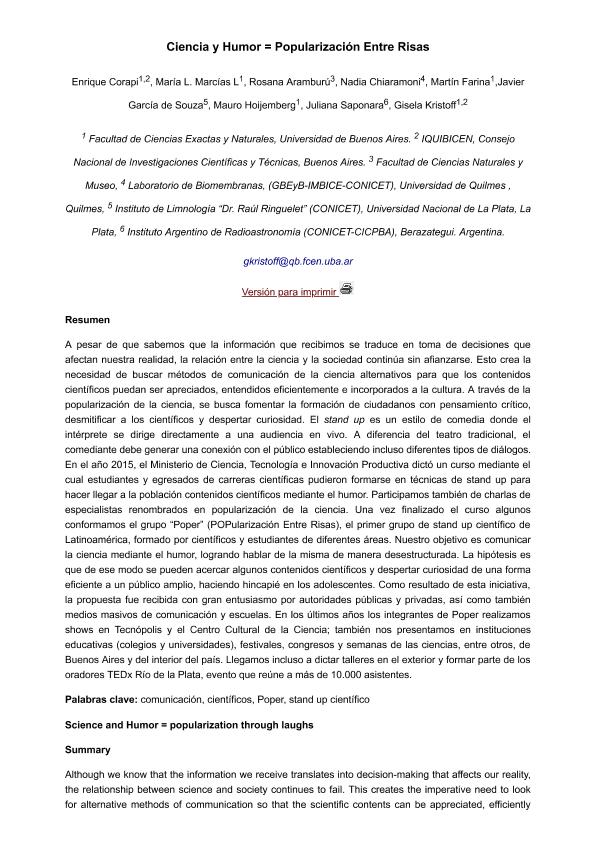Artículo
A pesar de que sabemos que la información que recibimos se traduce en toma de decisiones queafectan nuestra realidad, la relación entre la ciencia y la sociedad continúa sin afianzarse. Esto crea lanecesidad de buscar métodos de comunicación de la ciencia alternativos para que los contenidoscientíficos puedan ser apreciados, entendidos eficientemente e incorporados a la cultura. A través de lapopularización de la ciencia, se busca fomentar la formación de ciudadanos con pensamiento crítico,desmitificar a los científicos y despertar curiosidad. El stand up es un estilo de comedia donde elintérprete se dirige directamente a una audiencia en vivo. A diferencia del teatro tradicional, elcomediante debe generar una conexión con el público estableciendo incluso diferentes tipos de diálogos.En el año 2015, el Ministerio de Ciencia, Tecnología e Innovación Productiva dictó un curso mediante elcual estudiantes y egresados de carreras científicas pudieron formarse en técnicas de stand up parahacer llegar a la población contenidos científicos mediante el humor. Participamos también de charlas deespecialistas renombrados en popularización de la ciencia. Una vez finalizado el curso algunosconformamos el grupo ?Poper? (POPularización Entre Risas), el primer grupo de stand up científico deLatinoamérica, formado por científicos y estudiantes de diferentes áreas. Nuestro objetivo es comunicarla ciencia mediante el humor, logrando hablar de la misma de manera desestructurada. La hipótesis esque de ese modo se pueden acercar algunos contenidos científicos y despertar curiosidad de una formaeficiente a un público amplio, haciendo hincapié en los adolescentes. Como resultado de esta iniciativa,la propuesta fue recibida con gran entusiasmo por autoridades públicas y privadas, así como tambiénmedios masivos de comunicación y escuelas. En los últimos años los integrantes de Poper realizamosshows en Tecnópolis y el Centro Cultural de la Ciencia; también nos presentamos en institucioneseducativas (colegios y universidades), festivales, congresos y semanas de las ciencias, entre otros, deBuenos Aires y del interior del país. Llegamos incluso a dictar talleres en el exterior y formar parte de losoradores TEDx Río de la Plata, evento que reúne a más de 10.000 asistentes. Although we know that the information we receive translates into decision-making that affects our reality, the relationship between science and society continues to fail. This creates the imperative need to look for alternative methods of communication so that the scientific contents can be appreciated, efficiently understood and incorporated into the culture. The aim of scientific communication is to encourage the formation of citizens with critical thinking, demystify the scientist character and to generate curiosity. Stand up comedy or live comedy is a comedy style in which the performer must address directly to a broad live audience. Unlike traditional theater, the comedian must generate a connection with the audience by establishing different types of dialogues. In 2015, the Ministry of Science, Technology and Productive Innovation of Argentina gave a course through which students and graduates of scientific careers were able to train in stand-up techniques in order to get the people scientific content through humor. The attendees also participated in talks by renowned specialists in scientific communication. Once the course was completed, the Poper group was formed, the first scientific stand up group in Latin America. Made up of scientists and students from different areas, our main goal is to communicate science through humor, managing to talk about science in an unstructured way. The hypothesis is that in this way we can reach science contents and generate curiosity in an efficient way to a broad audience, emphasizing adolescents. As a result of this initiative, the proposal was received with great enthusiasm by public and private authorities, as well as mass media. In recent years the members of Poper gave shows at Tecnópolis and the Cultural Center of Science; we also performed in educational institutions, festivals, provincial Science Weeks, Congresses, among others, in Buenos Aires and in the whole country. We even dictated workshops abroad and were included as speakers in TEDx Rio de la Plata, an event that brings together more than 10,000 attendees
Ciencia y Humor: Popularización Entre Risas
Título:
Science and Humor: popularization through laughs
Corapi, Enrique Sebastian ; Marcías, María Laura; Aramburu, Rosana Mariel; Chiaramoni, Nadia Silvia
; Marcías, María Laura; Aramburu, Rosana Mariel; Chiaramoni, Nadia Silvia ; Farina, Martin Ezequiel; Garcia de Souza, Javier Ricardo
; Farina, Martin Ezequiel; Garcia de Souza, Javier Ricardo ; Hoijemberg, Mauro Ezequiel; Saponara, Juliana
; Hoijemberg, Mauro Ezequiel; Saponara, Juliana ; Kristoff, Gisela
; Kristoff, Gisela
 ; Marcías, María Laura; Aramburu, Rosana Mariel; Chiaramoni, Nadia Silvia
; Marcías, María Laura; Aramburu, Rosana Mariel; Chiaramoni, Nadia Silvia ; Farina, Martin Ezequiel; Garcia de Souza, Javier Ricardo
; Farina, Martin Ezequiel; Garcia de Souza, Javier Ricardo ; Hoijemberg, Mauro Ezequiel; Saponara, Juliana
; Hoijemberg, Mauro Ezequiel; Saponara, Juliana ; Kristoff, Gisela
; Kristoff, Gisela
Fecha de publicación:
04/2018
Editorial:
Universidad de Buenos Aires. Facultad de Ciencias Exactas y Naturales. Departamento de Química Biológica
Revista:
Química Viva
ISSN:
1666-7948
Idioma:
Español
Tipo de recurso:
Artículo publicado
Clasificación temática:
Resumen
Palabras clave:
COMUNICACIÓN
,
CIENTÍFICOS
,
STANDUP
,
HUMOR
Archivos asociados
Licencia
Identificadores
Colecciones
Articulos(CCT - LA PLATA)
Articulos de CTRO.CIENTIFICO TECNOL.CONICET - LA PLATA
Articulos de CTRO.CIENTIFICO TECNOL.CONICET - LA PLATA
Articulos(IAR)
Articulos de INST.ARG.DE RADIOASTRONOMIA (I)
Articulos de INST.ARG.DE RADIOASTRONOMIA (I)
Articulos(ILPLA)
Articulos de INST.DE LIMNOLOGIA "DR. RAUL A. RINGUELET"
Articulos de INST.DE LIMNOLOGIA "DR. RAUL A. RINGUELET"
Articulos(IMBICE)
Articulos de INST.MULTIDISCIPL.DE BIOLOGIA CELULAR (I)
Articulos de INST.MULTIDISCIPL.DE BIOLOGIA CELULAR (I)
Articulos(IQUIBICEN)
Articulos de INSTITUTO DE QUIMICA BIOLOGICA DE LA FACULTAD DE CS. EXACTAS Y NATURALES
Articulos de INSTITUTO DE QUIMICA BIOLOGICA DE LA FACULTAD DE CS. EXACTAS Y NATURALES
Citación
Corapi, Enrique Sebastian; Marcías, María Laura; Aramburu, Rosana Mariel; Chiaramoni, Nadia Silvia; Farina, Martin Ezequiel; et al.; Ciencia y Humor: Popularización Entre Risas; Universidad de Buenos Aires. Facultad de Ciencias Exactas y Naturales. Departamento de Química Biológica; Química Viva; 17; 1; 4-2018; 1-6
Compartir



